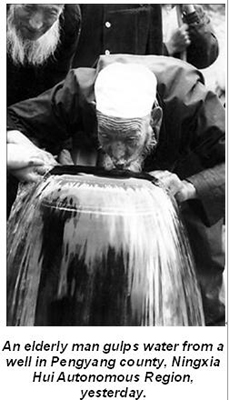It was not too long ago that a farmer in the drought-ridden plains of the Ningxia Hui Autonomous Region spent almost half of his household income on buying water.
During winter droughts, it was not uncommon for students here to carry their precious drinking water to school, only to have it freeze on the way. The youngsters had to lick the ice to quench their thirst, local headmaster Zhang Jin said.
Those who could not afford to buy water would resort to digging shallow holes in their backyards to catch meager amounts of rainwater that fell no more than five times a year.
Digging wells was impossible, because the groundwater that lay more than 100 m below the surface cost too much money and resources to reach.
So it is easy to understand why a dozen Han and Hui farmers, all aged over 60, could not hold back their tears during a visit on Tuesday to a military garrison in Ningxia.
The troops, affiliated to the Lanzhou Military Region, one of seven such regions, was given a special mission - to help residents in the arid northwest dig wells, for free.
Farmers in the village of Doupo in Pengyang received their first three wells in November, after the troops had worked there for 52 days.
"Now there is all this clean, sweet water. It is like a dream," village head Cui Huijun said.
The village's 323 families used to rely on rainwater. But the holes storing the precious resource were seldom full because local precipitation is just 200 ml a year, a third of the national average.
One of the new wells is located near the village primary school. Its more than 200 students and nine teachers no longer have to rely on a decade-old hole in the ground, or face the danger of it drying up, headmaster Zhang said.
Since it was founded in 1974, the regiment has dug 1,283 wells in more than 90 counties in nine western provinces. More than 1 million people have benefited.
The soldiers and officers set up camp when they help a village dig wells.
The troops bring their own water and food.
The soldiers said they are devoted to the mission is because they can share the farmers' feelings.
In the village of Jiangkou in Yuanzhou county, farmers waited day and night alongside soldiers working on a well.
Hundreds of villagers stood around the well and wept when no water was found even after soldiers dug 120 m deep.
But despair turned to smiles when after digging for a further 30 m, the precious water gushed forth.
(China Daily January 24, 2008)


